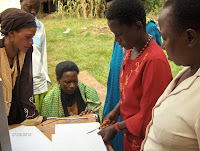


 Our Hospice ministry is committed to
rendering medical, spiritual and humanitarian services through programs
that enhance, educate and promote palliative care in the Busoga and
Tororo region. The Organization fosters end-of-life education,
information exchange and dialogue with the main objective of breaking
down communication barriers, while enhancing and accessing such
information that eases the burden of the effects of pain, dying and
death. Our service caters to HIV/AIDS and cancer terminal patients over the 100 square miles of the Jinja District and adjacent Tororo District. About 365,000 people benefit from our services.
Our Hospice ministry is committed to
rendering medical, spiritual and humanitarian services through programs
that enhance, educate and promote palliative care in the Busoga and
Tororo region. The Organization fosters end-of-life education,
information exchange and dialogue with the main objective of breaking
down communication barriers, while enhancing and accessing such
information that eases the burden of the effects of pain, dying and
death. Our service caters to HIV/AIDS and cancer terminal patients over the 100 square miles of the Jinja District and adjacent Tororo District. About 365,000 people benefit from our services.
The
program focuses on attitude change towards terminal illnesses and their
victims and mitigates the consequential effects of such illnesses
through end-of-life education, control of pain, and direct delivery of
the palliative care services to the individuals and the community.
Over half the districts in Uganda now have access to
morphine. Doctors and palliative care trained nurses prescribe it. It is
inexpensive – the price of a loaf of bread – can keep a patient pain
free for 2 weeks. Morphine is available in powder form provided free by
the government. The powder is then made up to varying liquid strengths
in the regional pharmacies. All the other drugs used in a palliative
care setting such as anticonvulsants, antibiotics, and diuretics must
be purchased. Our patient profile consists of HIV/Aids and Cancer
patients. 500+ patients, their careers and their families have been
cared for in their first year of service. The majority of the cancer and
HIV/Aids patients that we see have advanced disease. Palliative
radiotherapy and chemotherapy is unaffordable, unavailable or
inappropriate. The accepted principles of a modern palliative care
service are in place with a holistic approach to pain and other
symptoms. There is also support for the families during the illness and
in bereavement.







